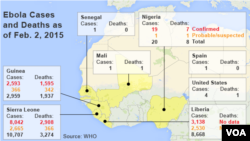The humanitarian aid group Doctors Without borders confirms reports of a downward trend of new Ebola cases in West Africa.
However the group -- also known by the French acronym MSF -- cautions that critical gaps remain in the hardest hit countries: Guinea, Sierra Leone and Liberia.
Jens Pedersen, MSF’s humanitarian policy advisor, said it’s important to keep in mind that it’s not yet the end of the Ebola outbreak in West Africa.
“We need to strengthen the focus on… surveillance which includes contact tracing, which is people who have been in contact with an Ebola positive patient. They need to be registered, monitored and to follow-up," he said. "We’re still seeing issues of stigma which are preventing patients from coming forward. So there is a greater need for much more social mobilization as well in order to make sure that the number of decreasing cases actually will lead to a hold in the Ebola outbreak.”
Pedersen highlighted various reasons for a decrease in Ebola in some areas while hot spots continue to persist in other locations such as in the case with Sierra Leone.
“We’re seeing a number of cases increase in areas where there is not the same access to treatment, where there has not been the same community engagement, and we’re seeing in some of the urban and western areas of Sierra Leone -- where of course the control of an outbreak in some of these environments where infrastructure is very poor, its’ very difficult to address,” noted the MSF worker.
In Guinea, there are still some areas of particular concern.
“One … is you have a stable number of cases where we’ve seen a geographical spread [of Ebola infections]. We’ve also seen a worrying trend which is only a very small number of the patients that are [found to be] Ebola positive at the facilities are actually on contact tracing lists, which means that they have been registered," Pedersen said. "That’s very concerning because it tells about the gap that there exists in the surveillance and monitoring system.”
The Ebola virus has devastated already weak public health systems in the three most affected countries. For example, Pedersen said Liberia, which has seen the sharpest decline in Ebola cases over the last few months, continues to face challenges, including a number of hospitals that remain closed.
“Many healthcare staff have been infected. The infrastructure in some of the facilities that have reopened are not necessarily adequate to ensure adequate protection of patients and staff, or caring for non-Ebola patients," he said. "There needs to be strengthened measures of infection control and prevention, for example, so you can be able to treat patients that are now having Ebola, but you can do it without having the fear that your patients have Ebola.”
MSF has treated more than 5,000 Ebola patients in the past nine months.
Pedersen says as the outbreak changes, their rapid response teams are adapting to how the outbreak unfolds and will continue to work to train local health staff in triage and infection control as well as fill in gaps in primary healthcare.
